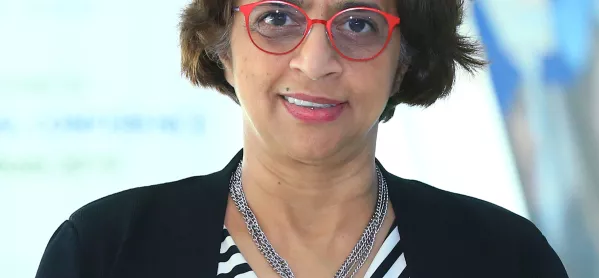The director general of the International Baccalaureate, Siva Kumari, has said that education must adapt and reshape itself to recognise the new world that is being created by Covid-19.
Speaking on the Tes International Podcast, Kumari said that in spite of the huge suffering the situation has caused, the opportunities it has presented to education cannot be overlooked.
“I really hope the world does not go back to what it was - I think that would be a real waste of this crisis and a real waste of this collective experience,” she said.
“Education has not been tested like this in a very, very long time and not been tested like this collectively all around the world.”
Skills-based learning
Specifically, she said the fact that so many students around the world will be entering a world that will look very different to what came before means that education cannot carry on as before, but must become more skills orientated rather than solely knowledge based.
“Students have world of information in front of them, they are going to be entering a world where there is a bunch of information at their fingertips, and so the kind of skills needed in the future…we know are really different to what we have now,” she said.
“The ability of students to ask really good questions, to synthesise information to present it in different ways, to really understand the global competitive landscape but also the global opportunities…I think those are things we really need to focus on rather than thinking about just about getting a grade or something like that.”
She added that skills such as resilience, agility and being able to self-motivate and self-start would all be crucial for young people entering a world where old certainties may well never exist again.
“The world is just going to be between lockdowns for at least the foreseeable future, so I think it is very incumbent on us to think, ‘what is good learning and what do we as an IB want to espouse and stand behind’, and I think we are going to have to deliver that sooner rather than later.”
Two-year assessments
One area in particular where she said this new focus could have a major impact - both in education in general but also within the IB Diploma programme - was to shift away from focusing too strongly on exams at the end of students’ learning and instead bring in more ongoing assessments.
“Before Covid, we were already designing our strategy for the next 10 years and as part of that we have been having these conversations about the end programme…where this heavy-duty summative experience does not reflect the real world anymore,” she said.
“It’s not where the world is going. None of us does that in our lives and it’s unlikely that the world is going to demand that kind of learning.”
As such, she says the IB Diploma will seek to evolve to incorporate more of this in the future: “We have always focused on what we are preparing this student for and it’s definitely going to be our future where we want to think more about the two-year experience rather than the end of course.”
Cancelling exams
During the interview, Kumari also addressed the decision made by the organisation in March to cancel the IB exams for students around the world - a decision she said had to be made with the right balance of speed and certainty.
“I think we were pretty fast [in responding]. You don’t want to overreact either in a crisis, so I think we needed to ensure before we made the decision about the examinations - which is the one decision that gets a lot of attention - we had to ensure he universities were OK with it,” she said.
“At the end of the day, you don’t want to short-change these students, so we had to have those conversations, and we needed to ensure the new system we were creating was really robust and something we could stand behind.”
You can listen to the complete interview below on the Tes International Podcast or stream it from your preferred streaming service.
Dan Worth is senior editor at Tes




